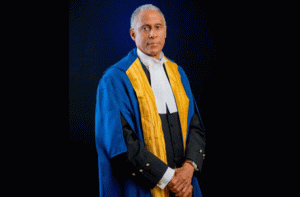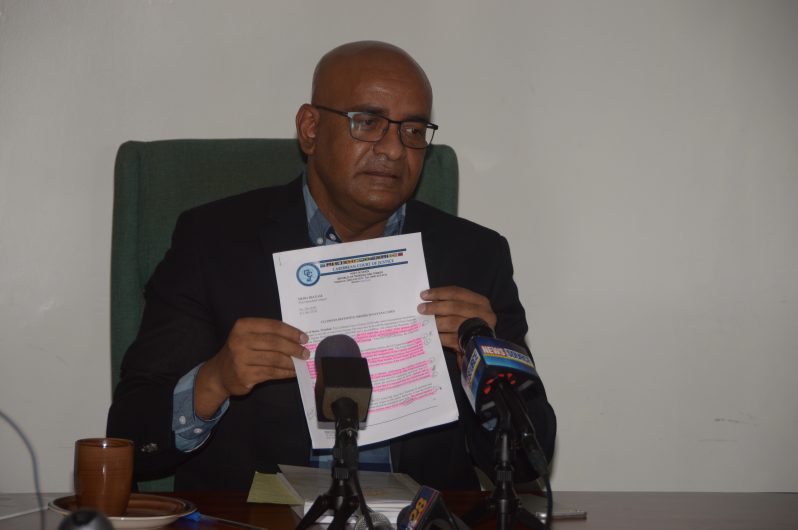…CCJ rejects September 18 election date proposal
…refused to entertain ordering appointment of GECOM chair in one week
…ignores submission for use of old voters’ list
DESPITE hailing the consequential orders handed down by the Caribbean Court of Justice (CCJ) on Friday as a victory, Opposition Leader Bharrat Jagdeo actually got none of the relief orders he sought in his proposals to the court and one of the lawyers in his team was even moved to dub the final judgement as disappointing.
Through his attorneys, Senior Counsel Douglas Mendes and Anil Nandlall, the Opposition Leader, in his submission, had asked the CCJ to order that elections be held within three months from June 18, 2019 – the day that the Court validated the December 21 vote of No-Confidence against the Government. In other words, he wanted elections to be held by September 18, 2019, but the CCJ, in upholding the submission of Attorney General Basil Williams, ruled that only the President, the National Assembly, and implicitly the Guyana Elections Commission (GECOM) can set timelines and a date for elections.
The President of the CCJ, Justice Adrian Saunders, in handing down those consequential orders on Friday, said the Court lacks the power to set a timeline or day for the holding of elections, explaining that the Constitution places that power in the ‘hands’ of the President, the National Assembly, and indirectly GECOM. In ‘rejecting’ the submission of the Opposition Leader, the Court said it simply cannot issue coercive orders or detailed directives dictating how the President and the National Assembly should act.

“It is not, for example, the role of the Court to establish a date on or by which the elections must be held, or to lay down timelines and deadlines that, in principle, are the preserve of political actors guided by constitutional imperatives. The Court must assume that these bodies and personages will exercise their responsibilities with integrity and in keeping with the unambiguous provisions of the Constitution, bearing in mind that the no-confidence motion was validly passed as long ago as 21 December 2018,” Justice Saunders explained.
Article 106 (7) of the Constitution said notwithstanding its defeat, the Government must remain in office, and hold an election within three months, or during an extended period approved by two-thirds of the National Assembly.
Justice Saunders said it is now the responsibility of the constitutional actors in Guyana to honour the letter and spirit of the Constitution. Though the Elections Commission has indicated that it is not in a position to facilitate credible elections before December 25 due to the fact that House-to-House Registration is now required due to expiration of the Official List of Electors, the Opposition Leader maintains that the Parliamentary Opposition – the People’s Progress Party Civic (PPP/C)– will not return to the House, in total defiance of the Constitution.
The Opposition Leader did not stop at date for elections, but submitted to the Court that it was not necessary for the Elections Commission to proceed with House-to-House Registration – a process that results in a fresh and credible List of Electors. According to him, the expired list can be used. “…It is respectfully submitted that in order so far as possible to ensure compliance with the constitutional mandate to hold an election no later than March, 2019, the election which must now be held, ought to [be] ordered to be held on the basis of the Official List of Electors in existence on March 21, 2019,” Jagdeo submitted. But by virtue of its decision that only the President, the National Assembly and GECOM can set out a timeline for hosting of elections, the CCJ has also rejected that line of argument by the Opposition Leader and his battery of lawyers.
In the case of Zulfikar Mustapha v The Attorney General, in which the process of appointing Justice (Ret’d) James Patterson was deemed flawed, Jagdeo said now that the post of Chairman of GECOM is vacant, the CCJ must order both him and President David Granger to ensure the expeditious appointment of a replacement Chairman.
He, therefore, asked the court to set a strict timeline for the appointment of a new Chairman of the Elections. Jagdeo, through his lawyers, submitted that the CCJ should order the President and the Leader of the Opposition to communicate with each other in good faith, not excluding meeting face to face, with a view to agreeing to a list of six persons, not unacceptable to the President, within one week of the date of handing down the consequential orders. But the CCJ did not set any guideline in that regard.
Instead, the CCJ said the need to issue consequential orders and directions, in the case of Zulfikar Mustapha v The Attorney General, has been rendered largely unnecessary because the GECOM Chairman voluntarily resigned his office subsequent to the decision.
“It is now a matter of the greatest public importance that the President and the Leader of the Opposition should, as soon as possible, embark upon and conclude the process of appointing a new GECOM Chairman. This imperative is now of the utmost urgency in light of our decision in the no-confidence motion cases that the motion was validly passed thereby triggering the need for fresh general elections,” Justice Saunders said.
Moments after the delivery of the consequential Orders by the Trinidad-based CCJ, Attorney Sanjeev Datadin, who represented recalled Member of Parliament, Charrandass Persaud, and endorsed the submissions of the Opposition Leader, said the orders were disappointing. “It was certainly not the ruling that we were looking for. The court has left a lot out,” Datadin told reporters outside of the appellate Court. According to him, the Court has the power to give clear directions on the holding of elections. “Certainly, it is a position where you won the battle but you lost the war because the Court has not done what it should have done in terms of laying clear guidelines,” the Attorney declared.



.jpg)









